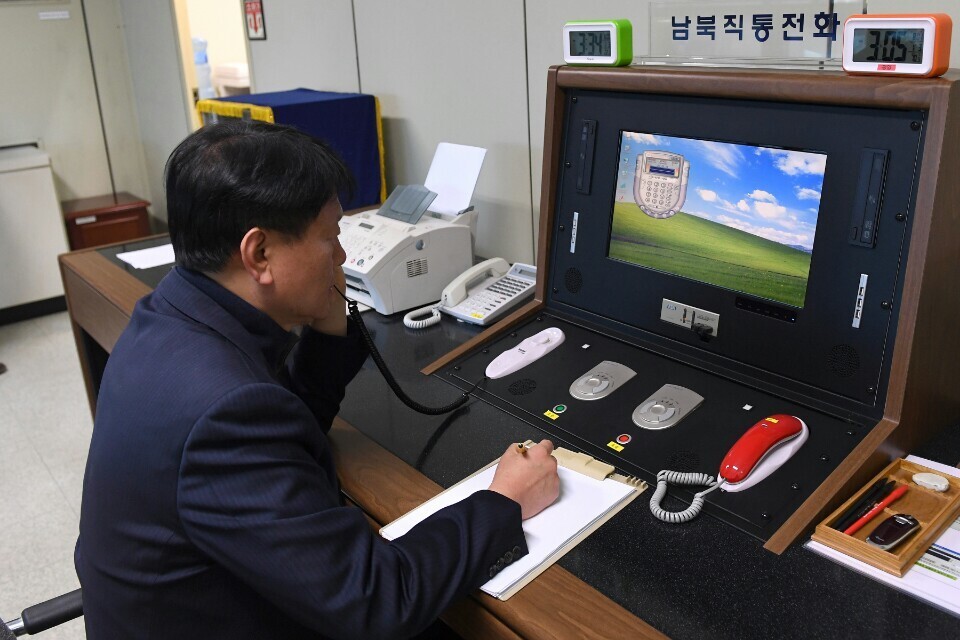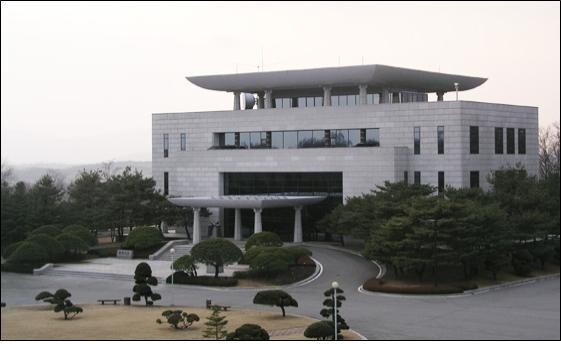hankyoreh
Links to other country sites 다른 나라 사이트 링크
[Editorial] Reopening of Panmunjeom channel significant first step in restoring inter-Korean relations


The inter-Korean communication channel at Panmunjeom was reopened at 3:30 pm on Jan. 3. The restoration comes 23 months after North Korea unilaterally shut the channel down after the closure of the Kaesong Industrial Complex in Feb. 2016. Since leader Kim Jong-un declared plans on Jan. 1 for North Korea’s participation in the Pyeongchang Winter Olympics, South and North have been trading gestures – Seoul on Jan. 2 with its proposal for high-level talks, and now Pyongyang with its reopening of the Panmunjeom communication channel on Jan. 3.
The channel’s normalization is tremendously significant as a first step toward restoring inter-Korean relations. It’s also something the Moon Jae-in administration has made a priority of pursuing. In the past, the two sides held two phone calls a day over the Panmunjeom channel. In addition to its symbolism in showing a pathway for inter-Korean dialogue that was open at all times, it also served a more practical role as an outlet for sharing information on urgent situations, and thereby heading off potential misunderstandings stemming from a lack of communication.
With the channel now normalized, some form of talks between inter-Korean authorities is also expected. But with North Korean Committee for the Peaceful Reunification of Korea chairman Ri Son-kwon declaring that the reopened communication channel would be used for “discussions of working-level issues related to the sending of our delegation [to the Olympics],” Pyongyang seems likely to restrict its function to practical talks on the delegation’s visit.
A better approach would be to hold high-level talks as Seoul has proposed, providing a forum for discussion divided family reunions and other issues between the two sides. Even if they are confined to working-level talks, any contact between South and North could provide a crucial turning point in improving relations.
The Trump administration has remained wary about the move toward dialogue between South and North. On Jan. 2, US President Donald Trump tweeted, “Rocket man [Kim Jong-un] now wants to talk to South Korea for first time. Perhaps that is good news, perhaps not – we will see!” US State Department spokesperson Heather Nauert said that if South and North Korea “decide that they want to have talks, that would be certainly their choice,” but added that the US was “very skeptical of Kim Jong-un’s sincerity in sitting down and having talks.”
The remarks seem to reflect disgruntlement and worries about the attitude from North Korea, with Kim making no reference to denuclearization in his New Year’s address and pairing his friendly signals to the Seoul with threats about the “nuclear button” on his desk to the US. But as Nauert noted the same day, the South Korea-US alliance isn’t the kind of relationship that is going to grow apart because North Korea decides to try to drive a wedge in it. To be sure, there’s a lot that is disappointing about the North’s attitude. But what is really unrealistic is to expect that Pyongyang is one day going to suddenly announce that it wants to pursue unconditional negotiations with the eventual goal of denuclearization.
Even if the inter-Korean dialogue that is just starting to get moving is not the kind that will lead right away to denuclearization discussions, there clearly is potential at least for it to serve toward opening the door to North Korea-US dialogue. The Trump administration needs to recognize that actively supporting inter-Korean dialogue accords with the US’s own interests. We urge both Seoul and Washington to work together in bringing Pyongyang to the negotiating table.
Please direct questions or comments to [english@hani.co.kr]

Editorial・opinion
![[Column] Park Geun-hye déjà vu in Yoon Suk-yeol [Column] Park Geun-hye déjà vu in Yoon Suk-yeol](https://flexible.img.hani.co.kr/flexible/normal/500/300/imgdb/original/2024/0424/651713945113788.jpg) [Column] Park Geun-hye déjà vu in Yoon Suk-yeol
[Column] Park Geun-hye déjà vu in Yoon Suk-yeol![[Editorial] New weight of N. Korea’s nuclear threats makes dialogue all the more urgent [Editorial] New weight of N. Korea’s nuclear threats makes dialogue all the more urgent](https://flexible.img.hani.co.kr/flexible/normal/500/300/imgdb/original/2024/0424/7317139454662664.jpg) [Editorial] New weight of N. Korea’s nuclear threats makes dialogue all the more urgent
[Editorial] New weight of N. Korea’s nuclear threats makes dialogue all the more urgent- [Guest essay] The real reason Korea’s new right wants to dub Rhee a founding father
- [Column] ‘Choson’: Is it time we start referring to N. Korea in its own terms?
- [Editorial] Japan’s rewriting of history with Korea has gone too far
- [Column] The president’s questionable capacity for dialogue
- [Column] Are chaebol firms just pizza pies for families to divvy up as they please?
- [Column] Has Korea, too, crossed the Rubicon on China?
- [Correspondent’s column] In Japan’s alliance with US, echoes of its past alliances with UK
- [Editorial] Does Yoon think the Korean public is wrong?
Most viewed articles
- 1[Column] Park Geun-hye déjà vu in Yoon Suk-yeol
- 2Thursday to mark start of resignations by senior doctors amid standoff with government
- 3N. Korean hackers breached 10 defense contractors in South for months, police say
- 4Kim Jong-un expressed ‘satisfaction’ with nuclear counterstrike drill directed at South
- 5[Editorial] New weight of N. Korea’s nuclear threats makes dialogue all the more urgent
- 6Will NewJeans end up collateral damage in internal feud at K-pop juggernaut Hybe?
- 7[Column] ‘Choson’: Is it time we start referring to N. Korea in its own terms?
- 8[Editorial] Japan’s rewriting of history with Korea has gone too far
- 9[Cine feature] A new shift in the Korean film investment and distribution market
- 10[Column] The president’s questionable capacity for dialogue